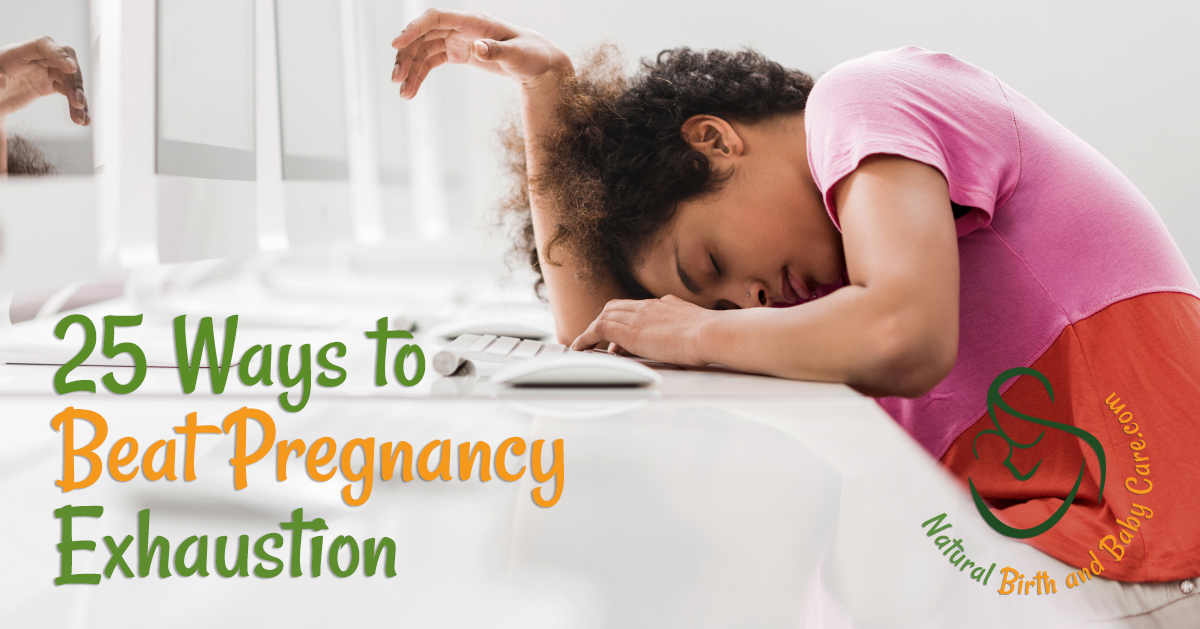
25 Ways to Beat Pregnancy Exhaustion
It can happen almost instantly – even before the test comes back positive… pregnancy exhaustion is real! I could not believe how tired I felt in my pregnancies – it was hard to drag myself out of bed or off the couch. As I had more babies, I knew that I had to find a way to overcome pregnancy fatigue. I didn’t find a “magic bullet” to take it away – but here are 25 tips that work together to help you boost your energy and feel like you’re back in the land of the living 😉
Keep reading to discover why pregnancy causes fatigue – and for 25 tips to help you overcome pregnancy exhaustion!
(NOTE: Trying to balance your pregnancy, life, and getting ready for baby? Use my checklist pack stay healthy (naturally), organized, and confident throughout your pregnancy! Get them here.)
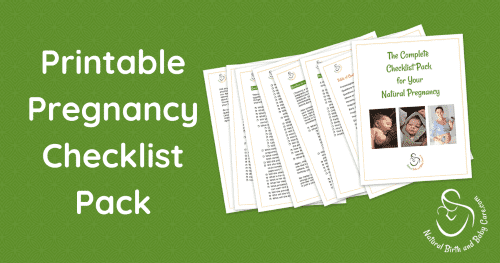
Why Pregnancy Fatigue Happens
Feeling fatigue – even exhaustion – is normal when you’re expecting. It’s one of the most challenging parts of early pregnancy, especially if you’re used to always being on the go. Suddenly, you can hardly get out of bed!
Early Pregnancy
It’s normal to have pregnancy fatigue occur at the beginning of your pregnancy – sometimes even before you get a positive pregnancy test.
Hormonal changes begin at conception, causing your estrogen and progesterone levels to skyrocket. Progesterone causes drowsiness (other hormones, like the “breastfeeding hormone” prolactin, also cause drowsiness – perhaps it’s nature’s design to encourage mothers to rest!).
Pregnancy exhaustion is most likely to occur in the first trimester, when you’re not used to high hormone levels and when the placenta is developing. Even though the placenta is small, it’s complex and requires a lot of energy to develop.
1st trimester changes that cause fatigue:
Your metabolism speeds up to help support your growing baby and the developing placenta. Your body changes profoundly across the nine months of pregnancy, too – every major system will change to help your baby grow. All of this takes energy, so your metabolism steps up.
Your blood pressure lowers and your blood sugar levels may lower, too. Insulin resistance changes during pregnancy, making changes to how your body uses carbohydrates and produces energy.
Stress and anxiety can be an issue throughout pregnancy, but may be especially strong at the beginning and end of a pregnancy. It’s completely normal to feel ambivalent about a pregnancy, and that creates stress for some women.
Additionally, many women today are successful, productive, family-oriented, and busy! The “warp speed” pace of modern life doesn’t fit very well with the much slower pace of a body growing a baby, and can leave you feeling worn out.
Severe morning sickness (or any other severe pregnancy discomfort) can leave you more exhausted than usual, as well.
Late pregnancy
You’ll likely have a break from fatigue in your second trimester, but many women find it returns in the third, especially as you get close to your due date.
3rd trimester issues that cause fatigue:
A primary cause of fatigue in the third trimester is your growing baby – you’re carrying your baby, placenta, amniotic fluid, and have a 60% higher blood volume! That adds weight and strain on your body, which can be tiring.
Many pregnant women find it difficult to get comfortable in bed and insomina can be a major cause of late pregnancy fatigue.
Like in early pregnancy, stress and anxiety can be a real issue – as you get closer to your baby’s birth, worries and concerns can come up and leave you feeling exhausted.
Pregnancy aches and pains get more, well, painful in the third trimester. Pelvic and back pain can be exhausting and lead to decreased energy levels.
When Will Pregnancy Fatigue End?
You often hear that extreme pregnancy exhaustion is a first trimester problem. It’s true that the first trimester is when you’ll feel the most profound exhaustion (it’s usually worse that what might return in the third trimester).
However, the fatigue doesn’t instantly go away at the end of the first trimester – many women find that it’s closer to 14, 15, or 16 weeks when that fatigue starts to fade.
You also won’t have exhaustion return instantly when you hit the third trimester – it’s usually the last 4-6 weeks of pregnancy, when baby is much bigger and it’s harder to get comfortable.
You’ll feel tired postpartum because giving birth and caring for a newborn are huge things that take all your energy. The best advice in the postpartum is to sleep when your baby sleeps. After eight babies of my own, I promise this is advice to live by.
25 Tips to Beat Pregnancy Exhaustion
On to the tips – none of these is going to magically take normal pregnancy fatigue and exhaustion away, but putting a few of them together can make a huge difference in your energy levels!
Pamper Yourself
It’s important to take time for yourself – getting rest is essential, but it’s not the only thing that goes into “rest.” The pace of life today is often frantic, which leads to exhaustion for all women.
That’s especially true during pregnancy, when your hormone levels are high and your body is doing so very much. Pregnancy is not a modern state of being – it’s a time when the body slows down to nurture your baby’s growth.
It’s okay for you to slow down, too. Build times in your day for extra sleep, yes (I’ll come back to this later) – but also build margin for mental down-time. Times when you can settle your mind and not worry about solving problems – just be. Good options are:
You get the idea – take time to simply relax and be… these mental breaks are essential and will refresh and recharge you!
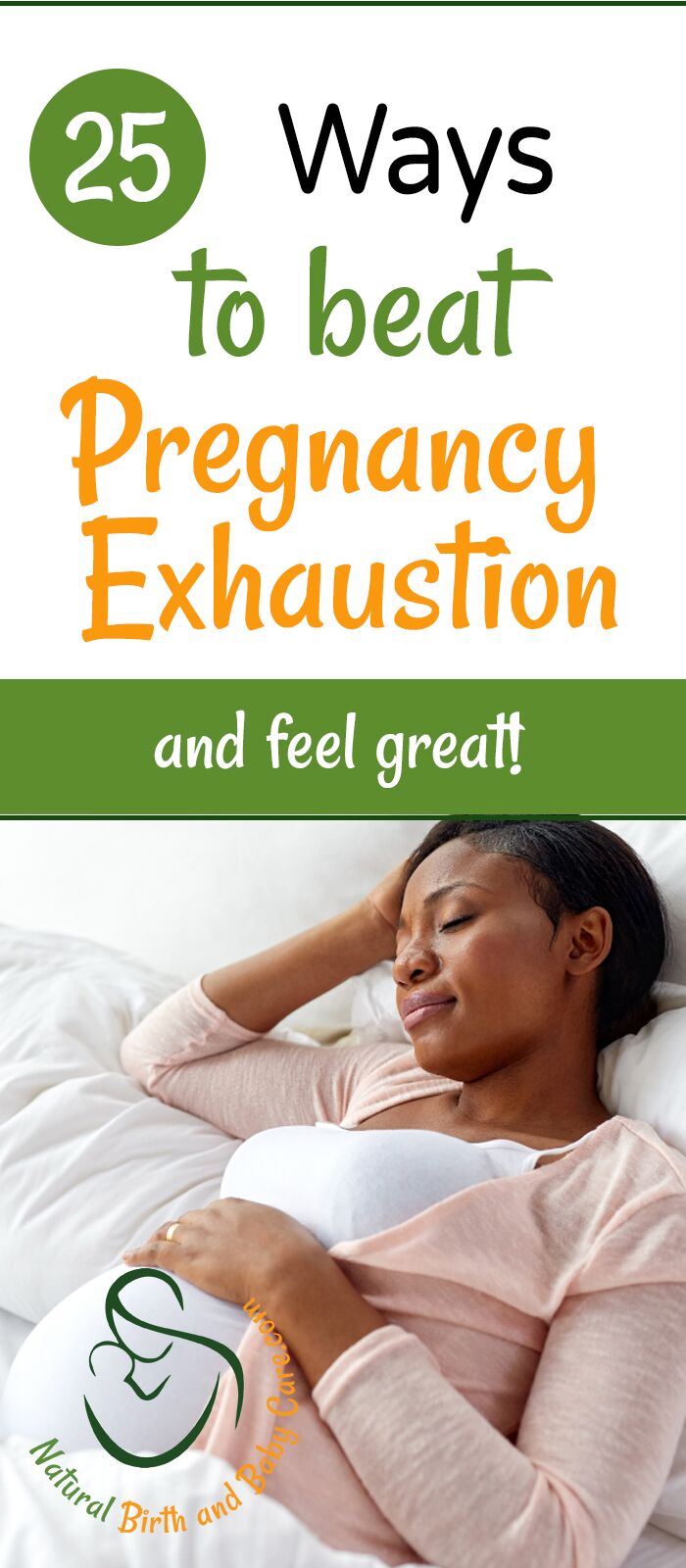
Ask for Help
Wonder Woman that you are, asking for help is an essential skill. My dad gave me the wise advice to:
“Ask for help, let other people worry about their response.”
It’s good advice – you’re probably reluctant to ask for help because of it what it might “say” about you – and how it might inconvenience others.
But you shouldn’t worry about those things. Asking for help is a sign of strength. And if the person you’re asking for help cannot do it, that’s okay… they can say that to you!
Look at your life and think of things others can do or help with. For example, ask your husband for help around the house.
Sometimes asking men for help can be difficult – as women we tend to hint and get frustrated when that “hint” doesn’t work. But it’s better to say something matter-of-fact like, “I’m tired at night and I don’t want to do the dishes myself. What do you think we should do?” This opens the door for problem-solving.
Don’t be afraid to ask for help from family and friends, and to use services available to you, such as having an employee at the grocery store pull your groceries for you.
Take Back Your Schedule
This ties in the first tip – you need to look over your schedule and take back time for yourself (and other things that are important to you).
Pregnancy, birth, and motherhood profoundly change your life. That doesn’t mean that you can’t juggle everything – as a wife, mama, homemaker, and business owner, I juggle a lot across the course of a week – and I’ve had 5 babies while juggling all of those parts of me!
So, I get it – you’ve got a lot going on in your life!
But it’s important to honor the profound, full-time work of pregnancy and how it impacts your life.
Take a look at your calendar and cross off anything that’s not essential. Are your older kids involved in things you could scale back on? Perhaps choose just one extra activity for a week. Let your kids take the bus or carpool to the school.
Block off times on your work calendar that are just for your – close the office door so that co-workers can’t bother you. Use that time for productivity…
…and then block off a little time for yourself in the mornings or evenings.
Even 1/2 hour a day can make a big difference in how you feel – so carve out that intentional time for yourself.
Reducing the obligations on your calendar helps you slow down the pace of life and conserve energy – and it helps you honor the awesome work that you’re doing in growing your baby.
Get Extra Sleep
Here it is! I hope you use a little of that time you’ve re-captured to get extra sleep. Try to sleep a little more at night.
Structure your evenings so you can get in bed a little earlier – or at least have a relaxing wind-down time before you get into bed (try to stay away from screens for awhile before bed – it will help you sleep better).
Now is a great time to get your little ones on a good schedule and create a strong (and firm) bedtime routine. Your children thrive on schedules and routines (just include periods of free play within the schedule) – and it can make a huge difference for you in getting some extra rest.
Make Your Bed a Comfortable Place to Sleep
Pregnancy can feel downright awkward at times – and it’s especially apparent in the bed!
This is more likely to be an issue as you get farther along in your pregnancy, but start addressing it as soon as it becomes and issue. Even in the first trimesters of my pregnancy, I wanted an extra pillow right against my belly because that pressure helped ease nausea – so do what you need to right away.
Extra pillows, especially a comfortable body pillow, can really help you create a comfortable “nest” in your bed. Husbands might feel frustrated by the growing number of pillows…
…but your sleep is important!
Also look at bedding. Are your sheets soft and comfortable – or are they itchy or worn out? Now is a good time to invest in new sheets. Do you feel too hot or cold? Do you get sweaty?
Bedding can make a big difference in temperature and how comfortable you feel.
(NOTE: Trying to balance your pregnancy, life, and getting ready for baby? Use my checklist pack stay healthy (naturally), organized, and confident throughout your pregnancy! Get them here.)

Make Your Bedroom a Sleep Haven
Your bedroom has an impact on the quality of your rest, too.
If at all possible, keep your room cool, dark, and clean. Studies show that sleep quality is better in cool rooms. A fan can help cool the room down and circulate air. If possible, allow fresh air into the room (it can be in the morning when you wake up during the winter – shut the window after a few minutes).
Also keep your bedding turned down for a few minutes – while you get dressed and go through skin care and hair routines in the morning is a good period of time. Make your bed after the bedding has aired out.
If possible, use your bed only for sleeping. Nap and sleep in it, but avoid using devices, watching TV, etc.
If your bedroom must be used for other things, try to create zones. For example, I read for about half an hour in the afternoons while my children have a nap/quite time – but I have a chair in my room for this purpose. I also record the podcast in my room (!!!), so I have a small desk to do that, which separates out my sleeping space from “work” space.
A clean room actually makes a difference in how you feel – now is a good time to spend 10 minutes or so each day decluttering and getting your room fresh and clean. Consider everything you have in your bedroom and ask yourself if it’s really needed – or if you can stow it somewhere else.
Good quality sleep comes in the dark – use black-out curtains to create a darker room and keep glowing lights to a minimum.
Candles, essential oils, and other accessories can help your room feel like a true haven. Have fun creating a space that’s restful for you!
Take a Daily Nap
Many pregnant women need time to rest in the afternoon. If you can carve out a little time each afternoon to nap, take that 20-30 minute power nap!
Even women working in the office can sometimes find time to make this happen – can you close your office door for 20 minute and rest with a white-noise app playing? Or can you go to your car for a 20-minute power nap?
Some women find that lying down for a little bit as soon as they get home from work is helpful.
I needed to rest during the day during most of my pregnancies – having my little ones on a nap schedule gave me the space I needed to lie down for a little bit and get rest of my own. It also helped when my baby arrived because we all kept a similar routine and baby quickly learned that time was afternoon nap time!
Be Intentional About Relaxation
As I said above, find times for yourself when you really relax.
It’s possible to have hours of down-time every day but feel even more exhausted than you did before!
Spending a lot of time on screens – watching the TV, scrolling through social media feeds, or playing online games – actually tends to exhaust us rather than refresh or renew us.
Instead, choose to relax in a way that renews or rebuilds you. Time in nature especially potent as a stress reliever and helps you clear your mind and find breakthrough on problems or issues troubling you.
Another good option for pregnancy is to make a habit of using a guided relaxation track that takes you through a deep relaxation. This is useful if you have trouble falling asleep during the day – I often used a guided relaxation in place of a nap during my pregnancies (I have one included in my online MamaBaby Birthing classes and also highly recommend the recordings in Hypnobabies).
Find ways to fully disconnect and find refreshment during your relaxation times – problems and concerns will be waiting when your time is over (and you might have fresh insight on how to handle them!).
Your body needs downtime – and so does your brain. You’ll feel more rested when you’re intentional about giving your brain a break!
Get Out and Move
I’ve hinted at it several times now, but it seems counter-intuitive…
…getting up and moving gives you more energy than sitting around doing nothing! You’ll feel better, strong, and more energized when you take time to get up and move.
I felt really terrible during early pregnancy with my 5th baby – so bad it was really prenatal (perinatal) depression. One of the things that helped me the most was starting to move and be more active (you can read about my experiences with prenatal depression in my series Walking Through Shadows – part 2 is where I discuss how movement helped).
Getting up and moving even helped relieve the nausea that I felt during that pregnancy.
Movement isn’t a panacea that will solve every problem, but it will make a significant difference in how you feel now – and it’s a great way to prepare for birth.
Regular movement increases circulation and promotes lymphatic flow. Your respiratory system improves with regular movement. All of this helps boost energy levels. It also improves digestion so that, overall, you feel much better!
Walking is a simple way to get started, but any prenatal routine works. I loved prenatal belly dance – it’s just the right combination of gentle moves, dance that gets your heart pumping, and special times of connection with your unborn baby <3

Stretch After Sitting for Awhile
This seems basic, but it goes back to what I mentioned above – you need to get your blood circulating and your body moving.
Many women feel really drowsy after they’ve been sitting for awhile. And the truth is, working at your desk is exhausting. “Mental exercise” is surprisingly strenuous work.
Get up periodically – at least every hour, though two times an hour is ideal. Some people find that working with a “pomodoro” time chunk is helpful – 25 minutes of focused activity followed by a 5 minute break.
Get up and move during that break time – it’s especially beneficial if you can step outside, or if you can at least look out a window while you stretch (focusing your eyes on something far away is important after you’ve been working at a computer or doing a lot of book work).
These mini-breaks throughout your day help reduce fatigue because they promotion healthy circulation and good breathing. Taking a few minutes out in nature can rejuvenate you and help you prepare for the rest of the day.
Try and get up and do a little movement regularly even if you feel like you need to spend all day on the couch – it will help!
Get Outside
I hinted at it already, but nature brings many benefits throughout life – even your baby benefits greatly from being outside in nature… right from birth!
Time in nature has huge benefits to you while you’re pregnant. Weather makes a difference, of course, but I recommend trying to get outside even in colder temperatures. Bundle up and feel the fresh air on your face!
If it’s warm enough, try to spend some time outside with your feet bare – feeling the warm earth or grass on your feet and having a connection with earth tends to have a ground, energizing effect on you.
Just walking through a local park or along a nature trail is good for you. Fresh air and the gentle, muted colors of nature refresh people. We’re bombarded by bright, over-saturated colors everywhere we turn – especially in advertising and news media.
Nature, while providing positive stimulation, is actually associated with bringing feelings of calm and peace. Enjoy nature’s palette, sounds, and smells.
Avoid Caffeine
Many people get through their daily lives fueled on caffeine. While a little caffeine (about a cup and a half a day is OK) isn’t harmful to baby, it also isn’t good for you or your baby.
Caffeine causes problems because of its addictive qualities. When you have some caffeine you feel better, but when those effects drop off you may feel more tired than you felt before.
Additionally, if you’re unable to have your caffeine for some reason, you experience headaches and other withdrawal symptoms that compound pregnancy fatigue and nausea.
Caffeine can also cause mild dehydration, which leads to more fatigue and nausea – as well as possible cramping. None of these things feels good and can leave you more worn down than you were before!
If possible, switch to nourishing beverages like milk, herbal teas, or warm broth. Water is good for quenching your thirst between meals or warm drinks.
Eat a Nourishing Diet
This is one of the most difficult tips during the first trimester because nausea can be a real issue. Food is a “Catch-22” because not eating makes you feel worse, which makes it harder for you to eat!
But a nourishing diet is essential to giving you energy and actually helps to reduce nausea – which in turn reduces fatigue.
One of the bigger triggers of nausea during pregnancy is low blood sugar – which also causes feelings of extreme fatigue.
Avoid snacking on food that’s just empty carbohydrate (which is what much of our “comfort foods” are) – that will spike your blood sugar quickly and you may feel better, but it will crash just as quickly, leaving you more depleted (and likely more nauseated) than before.
Eat Regularly Throughout the Day
Eat small, but regular meals of nourishing foods. When you’re struggling with blood sugar and energy, it’s good to make sure these meals and snacks are balanced – protein, fat, and carbohydrate. Getting each of the macro-nutrients keeps your blood sugar stable the longest and nourishes you and your baby.
These regular meals – try not to go longer than about 2 hours without having a snack or meal – keep your blood sugar level and give your body the fuel it needs to keep going.
When you get to the 3rd trimester and fatigue returns, eating frequently becomes important again. Your baby is taking up so much room that it’s hard to eat much at any given time, yet your body is doing an enormous amount of extra work as you sustain your baby, the placenta, and major changes in every system of your body.
Regular meals and snacks help you avoid feeling overfull and bloated because you can eat smaller meals overall and still get in the number of calories your body and baby require.
Avoid Sugar
Sugar is the king of empty calories! You want to avoid it because of the blood sugar spikes it brings…
…quick spikes that lead to quick crashes, nausea, and exhaustion.
While sugar is appealing and abundant in our society, it’s not good for you or your baby. Have sugary foods occasionally and make your normal diet lower in sugar.
It can be important to have carbohydrate foods in the first trimester when energy is often at its lowest and nausea is at its worst. But choose more balanced foods, such as yogurt with fruit and nut mixes. These foods give you a more balanced macro-nutrient profile.
You don’t have to avoid carbohydrates altogether – for example, toast with peanut butter or Spanish rice with cheese would both be good choices for the first trimester.
But you do want to avoid foods that are “pure sugar” and if you decide to indulge, blunt that with something else (have a cookie for your after-supper dessert, for example, rather than on its own for a snack).
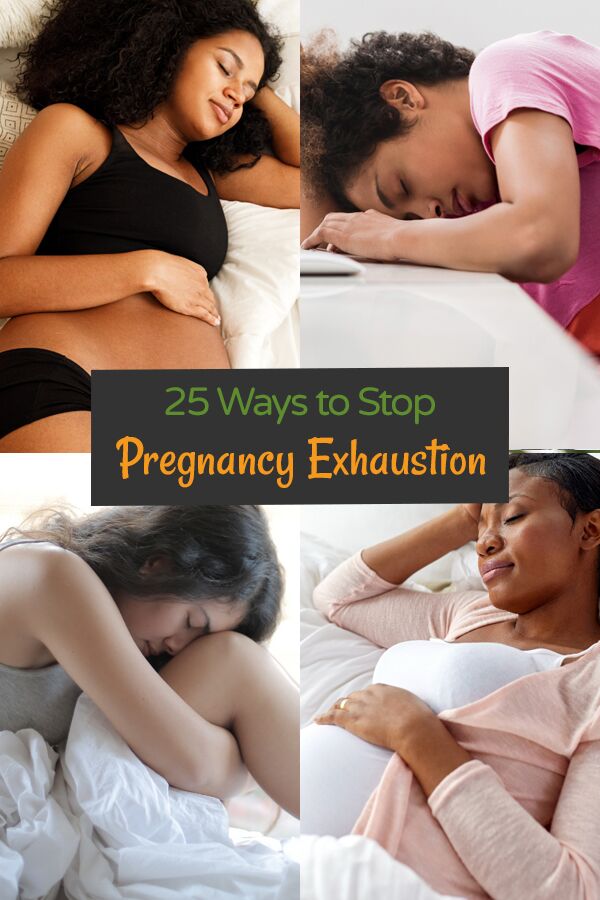
Have a Midnight Snack
Some women in the 1st trimester benefit from a midnight snack, but it seems to help women struggling with fatigue in the 3rd trimester most.
Remember I shared that your stomach just can’t hold as much due to your baby’s size and the shifting of all of your other organs. However, this is a time of great energy needs because your body is carrying baby, placenta, amniotic fluid, 60% more blood, and preparing for labor and delivery!
Some women find they have trouble sleeping at night – and part of that can be discomfort – but a surprising number of women wake up because they’re hungry!
A simple snack beside your bed can make a world of difference in the quality of your sleep.
Like I suggested above, choose a snack that’s well-balanced with some fat, some protein, and some carbohydrate – this helps balance blood sugar so you wake feeling better.
Some women find that Vitamin-C rich snack is particularly helpful at night. Cheese cubes and orange slices, or a cup of yogurt with citrus fruit, for example, can be good choices.
Keep the snack on your bedside table or in an insulated lunch bag by your bed so you can quickly snack and get back to bed!
Check Your Iron Levels
Low iron levels can contribute significantly to pregnancy fatigue – so if you feel overly tired, it’s worth it to get your iron checked.
It is normal for pregnant women to experience a drop in iron levels. This is because your blood volume expands by around 60% by the beginning of your third trimester. That is a lot of extra blood.
The iron in your blood is somewhat diluted by this expansion. In fact, the slight drop is often a reassuring sign to midwives, because it’s evidence of blood volume expansion.
If you went into pregnancy with low iron levels, however, this can cause you to feel fatigued because you’re truly deficient.
You can also experience deficiency if you’re having a hard time eating.
I highly recommend you make eating iron-rich foods a part of your normal diet. You can also eat iron-rich foods along with Vitamin C to enhance the absorption of iron.
Though you may hear of vegetarian sources of iron, the nutrient is most bio-available to your body if you get it from animal foods.
Meats are a good source, as are egg yolks. Have your meat with tomato-based sauces and consider having sliced oranges as a side dish for eggs. This gives you Vitamin C and iron together.
Cooking food in cast iron pots (especially sightly acidic dishes such as tomato-based sauces) also increases the iron level of your diet.
Liver is an excellent source of iron and some women crave pate and other liver dishes during pregnancy! It’s safe to eat around once a week – the only liver with dangerously high levels of Vitamin A is polar bear liver (which you’re probably not having served but I want to make sure you know!). Beef, lamb, bison, or chicken liver dishes are all safe around once a week.
Many women crave heartier animal foods during pregnancy, and iron may be one reason.
If you still find you’re having a hard time with iron levels, however, a gentle iron supplement like Optimal Iron is worth trying. This gentle supplement was formulated particularly for women who have trouble keeping their iron levels high. If you start taking it and you need iron, your energy levels will increase dramatically!
Please take iron supplements at night before bed, because iron binds up calcium receptors and decreases your calcium absorption. Taking your supplement at night avoids binding calcium from your food and prenatal vitamin.
Be Smart About Staying Hydrated
Dehydration can compound almost every pregnancy discomfort and is something you want to avoid, especially when you’re battling exhaustion.
Dehydration can cause headaches and exacerbate nausea, leaving you feeling terrible. At the same time, liquid can upset your stomach if you’re struggling with nausea.
It’s best to eat regularly like I suggested in the tips above – and have sips of liquids throughout the day.
If plain water upsets your stomach, try a flavored water (watch for sugar in the flavors, though). Or, opt for something like herbal tea, milk, or a warm soup broth. Slow-simmered broths are especially good because they have a lot of minerals and even moderate levels of protein from being slow-cooked.
Listen to your body on drinking, but do be sure you get enough to drink. If you’re struggling with headaches, or if you feel cramping or a lot of Braxton-hicks contractions, that may be a sign you need more liquid throughout your day.
Do try to limit how much you drink in the couple of hours before bed. If you drink a lot right up to bedtime, you’re likely to need to use the bathroom even more than usual in the night, which clearly interrupts your rest!
Spread your water and hydration goals across the daytime hours and limit what you have later in the evening.
Ask for a Thyroid Check
Another check to have done if your exhaustion is profound is a thyroid check. Pregnancy also impacts the thyroid, but basic checks can help you understand if you’re struggling with low thyriod levels.
Make sure your care provider understands pregnancy’s impact on the thyroid and if your thyroid levels come back low, what treatment options are safe for pregnancy.
Getting low thyroid addressed can make a difference in your energy levels during pregnancy and after your pregnancy, too!
Address Causes of Pregnancy Pain
Pain is exhausting. You’re more likely to experience pregnancy-related pain in the 3rd trimester, but morning sickness can be exhausting in the 1st trimester.
If you experience pain at any point in your pregnancy, start looking for solutions! Many pregnant women experience back pain and many experience pelvic pain. A chiropractor or physical therapist can help you relieve these types of pain. Your energy levels will greatly improve when you don’t hurt all the time.
A pregnancy support band can make a difference for many types of pain, including round ligament pain. This pain is from ligaments stretching as your uterus grows.
Eating a diet rich in minerals and micro-nutrients can help with muscle and ligament pains, too. Getting extra magnesium can ease leg cramps and restless legs at night, both of which can make restful sleep difficult.
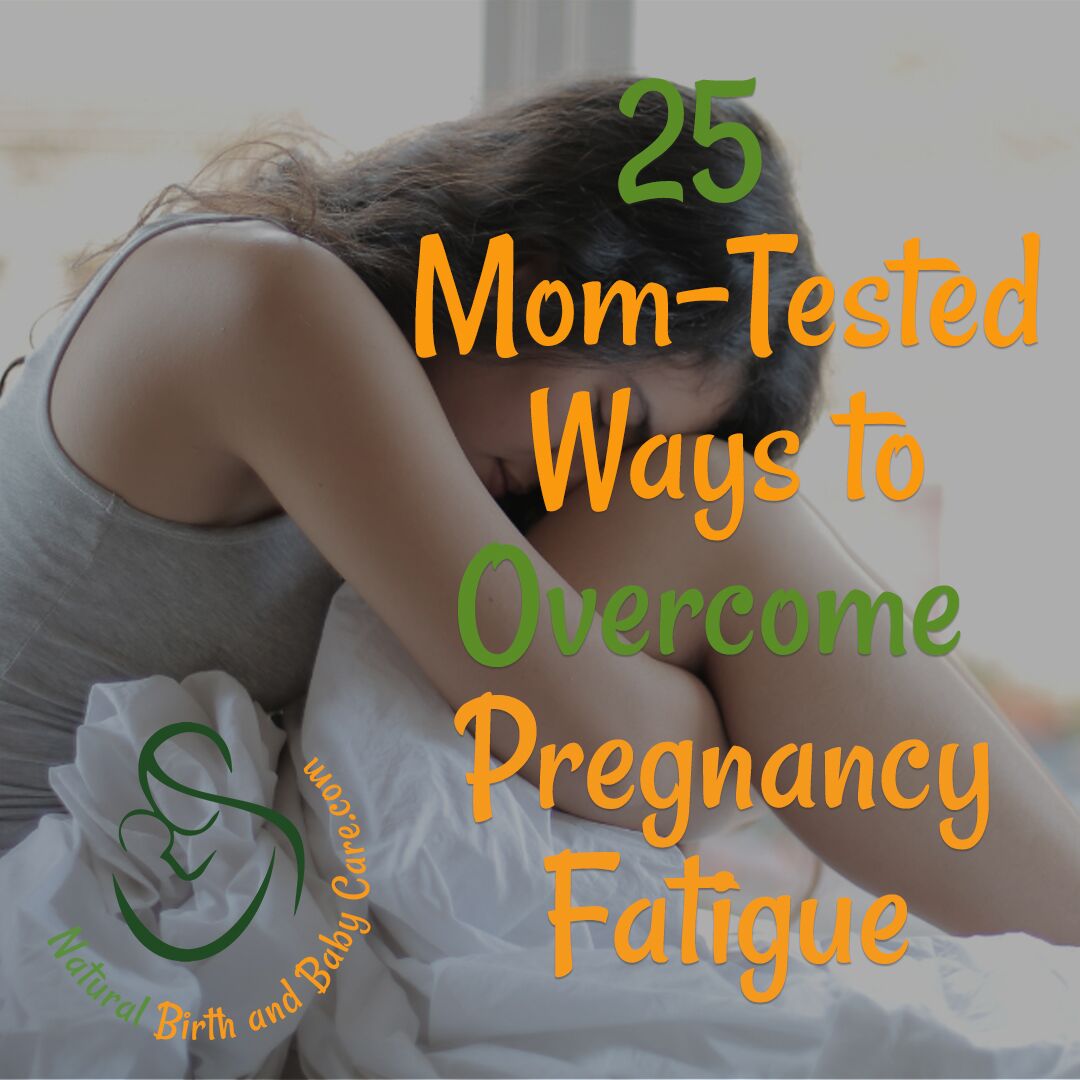
Mind Your Emotional Health
Your emotional health play a role in your energy levels. Cultivating the habit of being positive and showing gratitude can boost your mood and help you feel better…
…which in turn gives you more energy.
Take some to think about the emotions that you feel…
…and to be accepting of those. All of what you feel – happiness, sadness, fear, anxiety, anger, etc., all of it is normal and okay.
Accept your emotions – but you don’t have to let them control you. Once you’ve accepted a feeling as normal and okay, you can tell that part of you (for example, the part of you that’s really angry at your toddler for coloring on the wall!) that you’re going to handle this calmly…
…and then do that! Being mindful of your feelings and acknowledging them can help you process and overcome negative emotional habits and replace them with positive ones.
Many women find that pregnancy is a time of personal and spiritual growth. If that resonates with you, this is a good time to work on that and see if the positive energy helps your physical energy!
Handle Stress and Anxiety
Chronic stress is exhausting. If you spend a lot of time feeling stressed or anxious it’s going to cause fatigue – even debilitating fatigue.
There’s no way to remove all stress from your life – and that’s not desirable, either. In fact, it’s healthy for your baby to “feel” you experience some stress and then “feel” you use healthy ways to calm down. It helps condition your baby to healthy stress responses – for life!
The key is to handle stress in healthy ways. You may need to reduce things in your life that cause you stress – take a step back and ask if you can reduce any of your stressors. Can you say “no” to a few more things so that you have more time for yourself?
If you have older kids, reduce the number of extra activities they’re doing every week so you’re not always on the go so much.
This is also a good time to start to understand healthy ways to handle stress and take care of yourself. It’s ideal if you can work on improving relationships and communication at this time (good communication is especially important when you’ll be parenting with someone!)…
…but you can do a lot of work within yourself. Taking time for you – warm baths, time to read or watch fun movies, time in nature, time with your hobbies, etc. are all ways to handle stress.
Get Your Kids to Help Out
Even the smallest toddler can help you – but older children can help out around the house. Ask your kids to bring you water and snacks if you’re stuck on the couch.
Young children can also help do basic laundry folding, and they can learn to move laundry from the washer to the dryer.
Have a basket where your children can put toys – if your child is old enough to take toys out, your child is enough to put toys away!
This is a good time to box up toys that aren’t played with often. Close off rooms and use baby gates to keep young children out of areas where they make messes.
It’s a good experience for older children to help around the house and it’s good for younger children to have healthy boundaries and some small ways to help 🙂
Now is probably not the time to undertake an extensive new chore schedule for your kids – it takes work on your part to teach chores.
You could work on one chore at a time over a few days, but go easy on yourself and your kids – have them help with simple things and slowly work towards more help.
Help Your Kids be More Independent
Helping your children – even little ones – learn to follow a good routine brings major benefits for you. One of the biggest? Time for you to rest without worrying about your child.
Children also benefit from time for creative, independent play. Adult-organized activities can be great, but all children need time for their own creativity and problem-solving to lead the way.
Even if you schedule your child’s day (and I believe both you and your child will benefit from a regular schedule because it reduces stress and anxiety), build in periods of free play. Here are ideas for free periods for your child:
Your child doesn’t have to be completely alone – for example, you can sit nearby and read a book or do some work while your child plays in the yard or garden.
Many children are not used to having unstructured time to themselves and may need encouragement from you that they’re fine and can play during this time.
Young children may need to build up confidence with alone time. Listen to my podcast on Teaching Toddlers to Have an Alone Time for help. Your toddler can have an afternoon nap plus a morning and afternoon alone time, giving you time to rest and take a break.
If you have multiple older children, this time can be a welcome break from sibling squabbles and hands-on parenting!
Related Questions
Is extreme fatigue normal in pregnancy?
Extreme fatigue is normal during pregnancy, especially during the first trimester. Many women feel that they can’t get out of bed or off of the couch. Some exhaustion can be rooted in medical causes, like low iron levels or thyroid imbalances – but most is a normal part of pregnancy.
How long does tiredness last in early pregnancy?
Early pregnancy tiredness typically lasts through the first trimester and may persist a couple of weeks into the second trimester. Some women get relief around 12 weeks, but other women may feel fatigue up through 14 or even 16 weeks. Energy usually starts to return at this point, and many women feel vibrant and energized!
How early in pregnancy does fatigue start?
Fatigue is one of the earliest pregnancy symptoms and can begin before you get a positive pregnancy test! Hormonal changes start immediately, and many women respond to increased hormone levels, especially progesterone levels, with increased fatigue. Other women don’t notice fatigue set in until they’re 4-6 weeks along.



